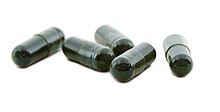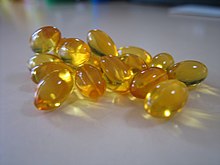




A dietary supplement is a manufactured product intended to supplement a person's diet by taking a pill, capsule, tablet, powder, or liquid.[2] A supplement can provide nutrients either extracted from food sources, or that are synthetic (in order to increase the quantity of their consumption). The classes of nutrient compounds in supplements include vitamins, minerals, fiber, fatty acids, and amino acids. Dietary supplements can also contain substances that have not been confirmed as being essential to life, and so are not nutrients per se, but are marketed as having a beneficial biological effect, such as plant pigments or polyphenols. Animals can also be a source of supplement ingredients, such as collagen from chickens or fish for example. These are also sold individually and in combination, and may be combined with nutrient ingredients. The European Commission has also established harmonized rules to help insure that food supplements are safe and appropriately labeled.[3]
Creating an industry estimated to have a value of $151.9 billion in 2021,[4] there are more than 50,000 dietary supplement products marketed in the United States,[5] where about 50% of the American adult population consumes dietary supplements. Multivitamins are the most commonly used product among types of dietary supplements.[6] The United States National Institutes of Health states that supplements "may be of value" for those who are nutrient deficient from their diet and receive approval from their medical provider.[7]
In the United States, it is against federal regulations for supplement manufacturers to claim that these products prevent or treat any disease. Companies are allowed to use what is referred to as "Structure/Function" wording if there is substantiation of scientific evidence for a supplement providing a potential health effect.[8] An example would be "_____ helps maintain healthy joints", but the label must bear a disclaimer that the Food and Drug Administration (FDA) "has not evaluated the claim" and that the dietary supplement product is not intended to "diagnose, treat, cure or prevent any disease", because only a drug can legally make such a claim.[8] The FDA enforces these regulations and also prohibits the sale of supplements and supplement ingredients that are dangerous, or supplements not made according to standardized good manufacturing practices (GMPs).
- ^ "Cod liver oil". Encyclopædia Britannica. 2018. Retrieved 18 February 2018.
- ^ "Dietary Supplements: Background Information". Office of Dietary Supplements, US National Institutes of Health. 24 June 2011. Archived from the original on 14 August 2020. Retrieved 2 February 2018.
- ^ "Food Supplements". European Food Safety Authority, European Commission. 2009.
- ^ "Dietary Supplements Market Size & Trends Report, 2021–2028". Grand View Research. San Francisco, CA. Retrieved 2021-07-30.
- ^ "Dietary Supplement Label Database". Office of Dietary Supplements, US National Institutes of Health. 2017.
- ^ Park M. "Half of Americans use supplements". CNN. Retrieved 3 October 2013.
- ^ "FAQs on Dietary Supplements". Office of Dietary Supplements, US National Institutes of Health.
- ^ a b "Structure/Function Claims". Office of Dietary Supplement Programs, Center for Food Safety and Applied Nutrition, U.S. Food and Drug Administration. 14 December 2017.